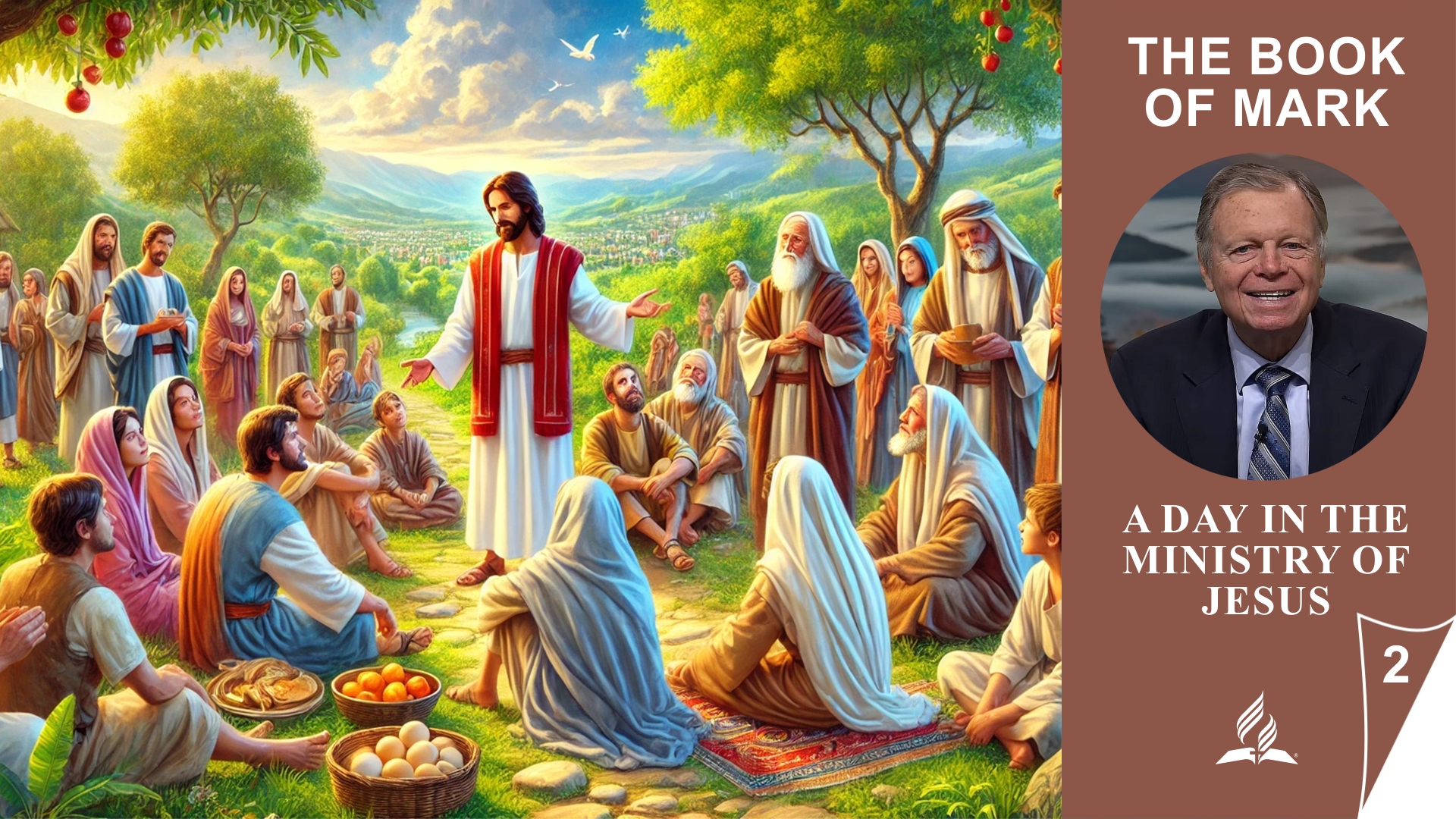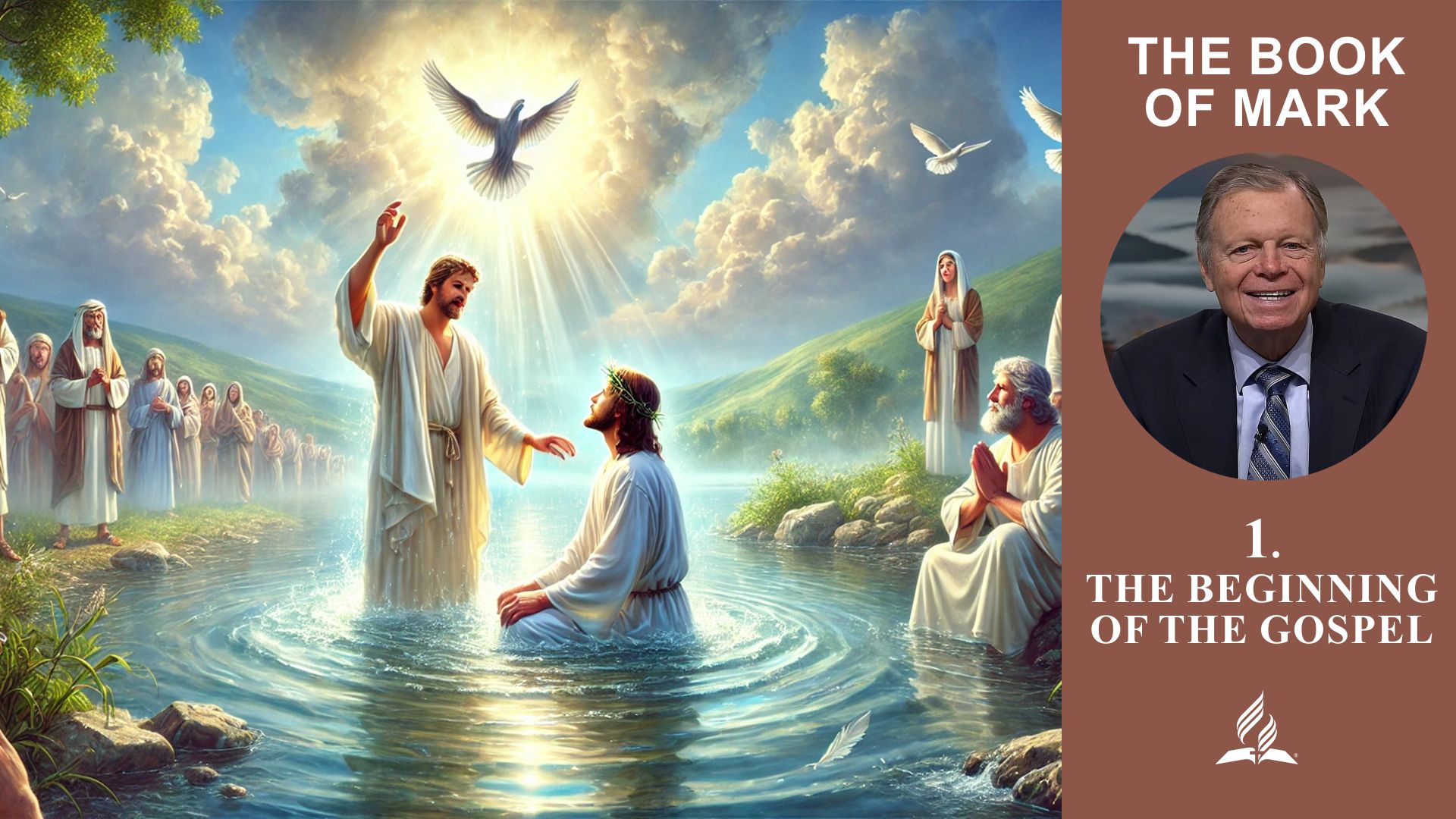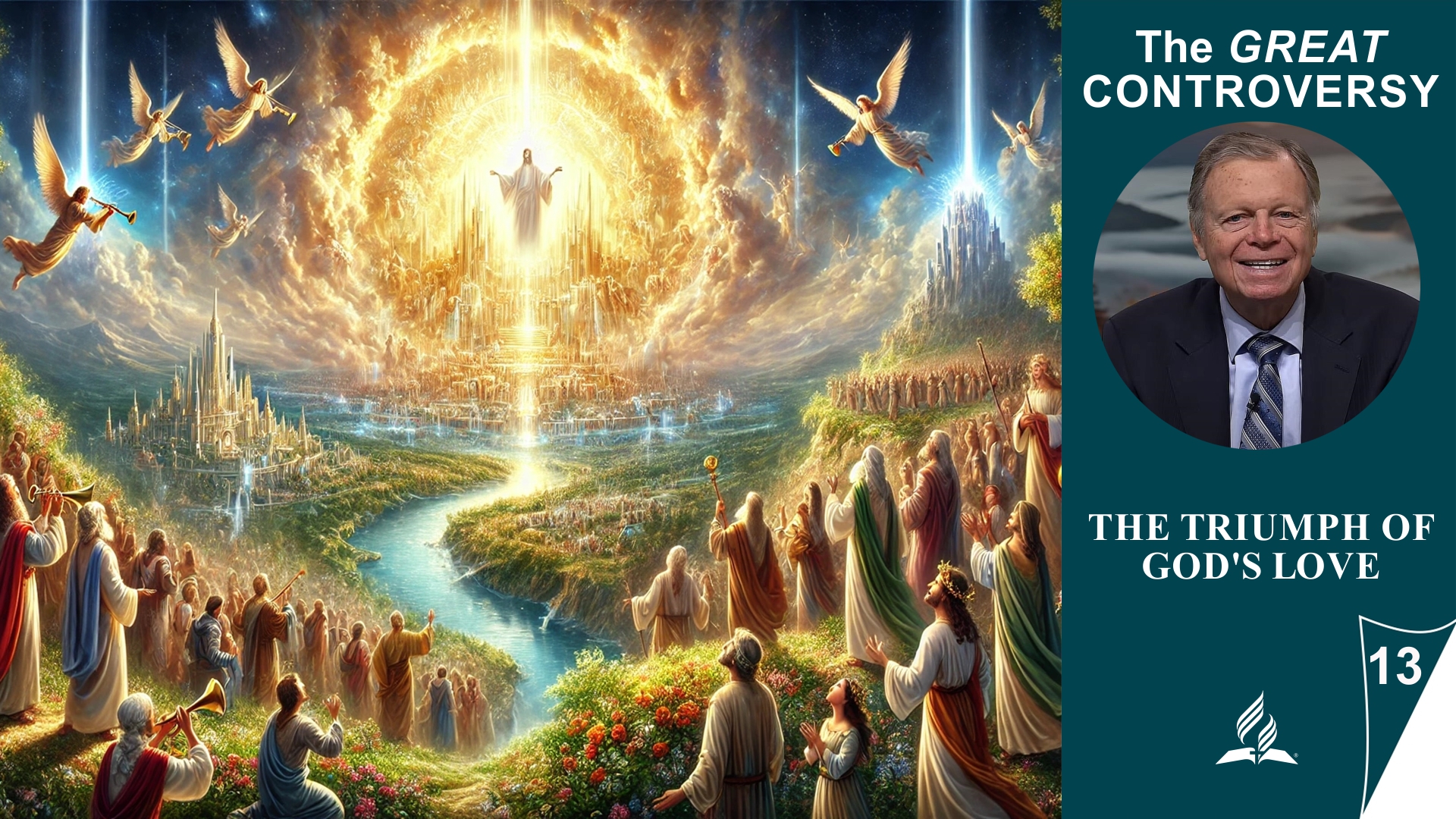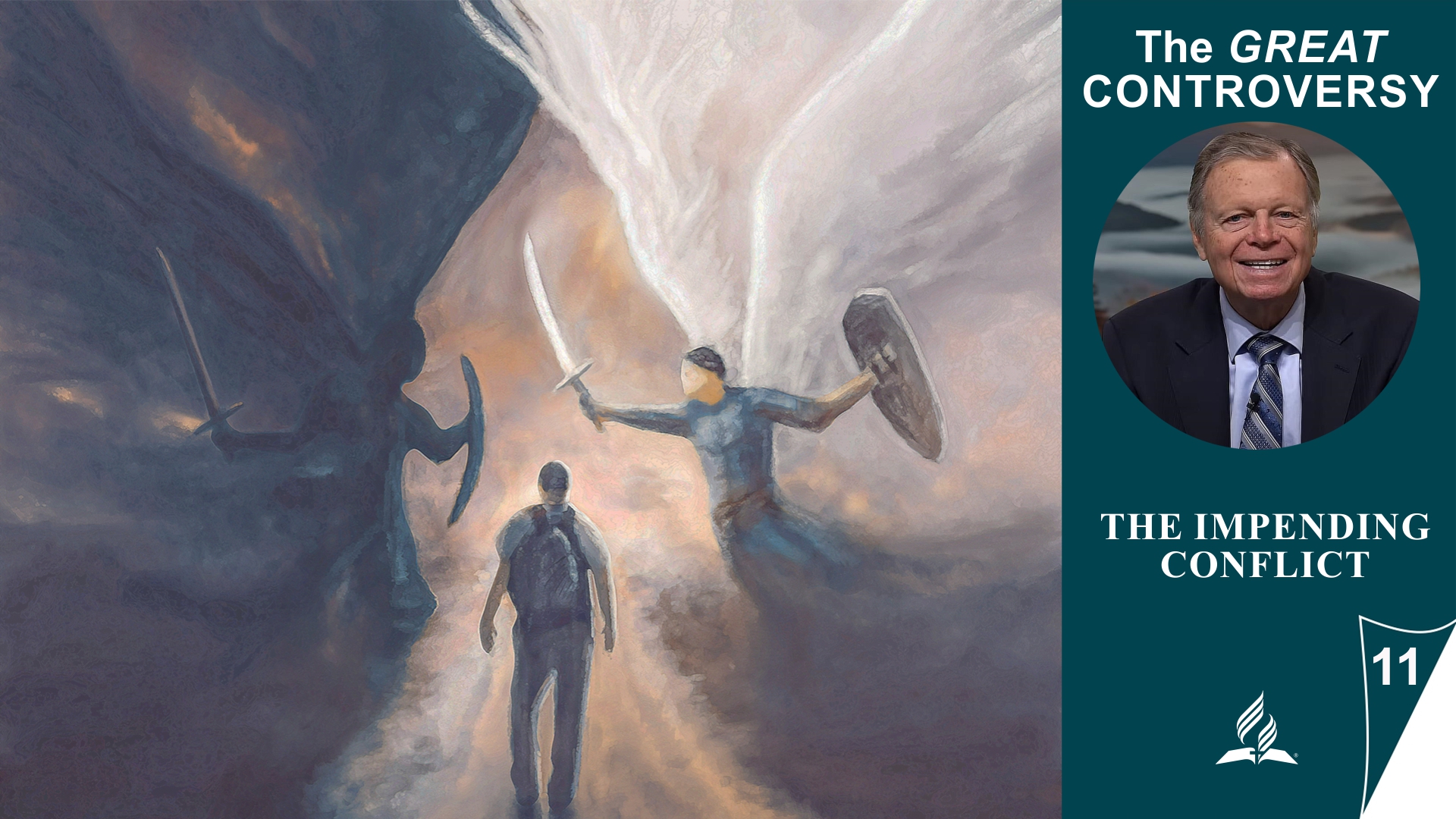
The Book of Mark – Lesson 1.The Beginning of the Gospel | Sabbath School with Pastor Mark Finley

Series THE BOOK OF MARK with Pastor Mark Finley |
Lesson 1.The Beginning of the Gospel |
Jesus’ Early Ministry in Mark
Lesson 1 delves into the early stages of Jesus’ ministry as narrated in the Gospel of Mark. It begins with John the Baptist’s role in preparing the way for Jesus, emphasizing the significance of repentance and baptism. The lesson highlights Jesus’ baptism, where He is affirmed by God and anointed by the Holy Spirit, marking the start of His public ministry. It also covers Jesus’ proclamation of the gospel, calling people to repent and believe as the kingdom of God is near. Additionally, the lesson explores the selection of the first disciples and Jesus’ early miracles, establishing His divine authority and mission.
Memory Text: Mark 1,14.15 – “Now after John was put in prison, Jesus came to Galilee, preaching the gospel of the kingdom of God, and saying, ‘The time is fulfilled, and the kingdom of God is at hand. Repent and believe in the gospel.’ ”
Content:
1.1 The Failed Missionary
Introduction and Early Setback of John Mark
John Mark is introduced in Acts 12:12 as the son of Mary, a wealthy supporter of the early church who hosted prayer meetings at her home. Although he does not play a significant role in the events of Acts 12, this introduction sets the stage for his later involvement with Barnabas and Saul. In Acts 13:1–5, 13, we learn that John Mark accompanied Saul and Barnabas on their first missionary journey, serving as a helper. However, in verse 13, it is noted that he returned to Jerusalem, leaving the mission. Ellen G. White suggests that fear and discouragement led to his departure, as he was unaccustomed to the hardships of missionary work. This early setback did not define his entire ministry, as John Mark would later be recognized for his contributions to the Gospel.
1.2 A Second Chance
The Redemption of John Mark
Paul rejected John Mark because he had previously deserted them and not continued in the ministry, as noted in Acts 15:38. Paul viewed the missionary work as demanding and needing reliable companions, making him reluctant to trust Mark again. However, Barnabas, seeing potential in Mark and unwilling to give up on him, chose to give him a second chance, leading to a sharp disagreement between Paul and Barnabas. This dispute resulted in them parting ways, with Paul taking Silas and Barnabas taking Mark. Later New Testament references, including Colossians 4:10 and 2 Timothy 4:11, indicate Mark’s significant recovery and valuable contribution to the ministry, showing that Barnabas’s faith in him was well-placed.
1.3 The Messenger
John the Baptist: Preparing the Way
Mark 1:1-8 introduces three main characters: Jesus Christ, God the Father, and John the Baptist. John is depicted as a preacher preparing the way for Jesus, fulfilling Old Testament prophecies from Exodus, Isaiah, and Malachi, which all speak of a journey. John calls for repentance and emphasizes the coming of someone much greater than himself, referring to Jesus. His humility is highlighted when he states he is not worthy to untie Jesus’ sandals. These verses set the stage for the beginning of Jesus’ ministry and the journey that will lead to His sacrificial death.
1.4 Jesus’ Baptism
The Baptism and Temptation of Jesus
Jesus’ baptism in Mark 1:9-13 includes significant figures and events. John baptizes Jesus in the Jordan River, and as Jesus emerges from the water, the heavens open, and the Holy Spirit descends like a dove. God’s voice proclaims, “You are my beloved Son; with you I am well pleased.” This moment highlights the presence of the Trinity, affirming the start of Jesus’ ministry. Following His baptism, the Spirit drives Jesus into the wilderness, where He faces temptation from Satan. This scene underscores both Jesus’ divinity and humanity, illustrating His unique role as both God and man.
1.5 The Gospel According to Jesus
The Gospel According to Jesus: Fulfillment, Kingdom, and Call to Repentance
Mark 1:14-15 presents Jesus’ gospel message in three key parts: the fulfillment of time prophecy, the nearness of God’s kingdom, and the call to repentance and belief. The time prophecy Jesus refers to is the 70-week prophecy from Daniel 9:24-27, which predicts significant events in Jesus’ life. This prophecy began in 457 B.C. and pointed to A.D. 27 when Jesus was baptized and started His ministry. His crucifixion occurred three and a half years later, with the prophecy’s completion marked by Stephen’s stoning in A.D. 34. This moment signaled the broader spread of the gospel to the Gentiles.
1.6 Summary
Jesus’ Early Ministry
Lesson 1 focuses on the early ministry of Jesus as described in the Gospel of Mark. It highlights significant events such as Jesus’ baptism by John the Baptist, which marks the beginning of His public ministry and the affirmation of His divine sonship. The lesson also covers Jesus’ initial proclamation of the gospel message, emphasizing the fulfillment of time prophecy, the nearness of God’s kingdom, and the call to repentance and belief. Additionally, the lesson addresses the selection of the first disciples and Jesus’ early miracles, which establish His authority and mission. Overall, it sets the stage for understanding Jesus’ role and the transformative power of His message.
The Great Controversy – Lesson 13.The Triumph of God’s Love | Sabbath School with Pastor Mark Finley

Series THE GREAT CONTROVERSY with Pastor Mark Finley |
Lesson 13.The Triumph of God’s Love |
Hope, Justice, and the Final Destiny |
In this final lesson, we explore how God’s love and justice triumph in the last days of Earth. We consider the hope that believers have in difficult times and the promise of Jesus’ soon return, which brings comfort and confidence. The millennium on Earth and the judgment during this period reveal God’s just actions and His efforts to save humanity. Finally, we examine the two eternities – the final destiny of the righteous and the wicked – and see how God’s love and justice ultimately prevail.
Memory Text: Revelation 21,3.4 – “And I heard a loud voice from heaven saying, ‘Behold, the tabernacle of God is with men, and He will dwell with them, and they shall be His people. God Himself will be with them and be their God. And God will wipe away every tear from their eyes; there shall be no more death, nor sorrow, nor crying. There shall be no more pain, for the former things have passed away.’ ”
Content:
13.1 Hope in the Time of Trouble
God’s Promises for the End Times
The events described in the Bible before Jesus’ return are marked by an intense time of tribulation and the final seven plagues, as described in Revelation 16. However, God’s people will be protected amid these challenges, similar to the plagues in Egypt. Those whose names are written in the Book of Life will be saved, which points to a deep and faithful relationship with Jesus (Daniel 12:1). In times of tribulation, a close personal relationship with Jesus is the only sufficient preparation to remain pure and faithful (1 John 3:1-3). Comforting promises in the Psalms and Revelation 3:10-12 assure us that Jesus is always with us and that our faith will remain strong, even when the world around us falls apart. In these difficult times, our longing for eternity and the desire to live forever with Jesus grow.
13.2 Hope in Jesus’ Soon Return
Comfort and Confidence in Troubling Times
Jesus’ assurance in John 14:1-3 that He will not leave us and will return to take us home gives us comfort and hope in the face of upcoming challenges and tribulation. This promise encourages us, reminding us of our true home and pointing to the “blessed hope” that has inspired believers of all generations (Titus 2:11-14). While the wicked are plagued by fear and guilt as described in Revelation 6:15-17 and Isaiah 25:8-9, the righteous experience peace and joy through the acceptance of God’s grace. The reaction of the redeemed in Revelation 15:3-4 and 19:7 shows their gratitude and reverence for Christ’s generous salvation. The sequence of events in Revelation 12:17, 17:13-14, and 19:11-16 reveals the final battle on Earth and Christ’s ultimate victory, instilling hope and confidence in our hearts.
13.3 The Millennium on Earth
Satan’s Imprisonment and the Revelation of Divine Justice
Revelation 19 ends with the dramatic return of Jesus and the destruction of the wicked, but the story continues in Revelation 20, which introduces us to the millennium, a period of 1,000 years. During this time, Satan is symbolically bound and cast into an “abyss,” meaning that he cannot deceive anyone due to the desolate and depopulated Earth. This corresponds to the description in 2 Peter 2:4, where Satan and his angels are kept in “chains of darkness.” Jeremiah 4:23-26 and 25:33 depict the Earth as devastated and lifeless, with Satan and his angels having to witness the destruction their rebellion has caused. This millennium vividly demonstrates the consequences of sin and God’s justice, love, and efforts to save humanity.
13.4 Judgment in the Millennium
Divine Justice and the Clarification of All Questions
During the millennium, the righteous will reign with Christ in heaven and have the opportunity to understand God’s justice (Revelation 20:4-6). They will be able to ask questions and comprehend why some people are not in heaven, recognizing God’s fair and loving judgments. This will strengthen the redeemed’s trust in God’s justice and His efforts to save every person. At the end of the millennium, the wicked dead will be resurrected, Satan will deceive the nations one last time, and there will be a final confrontation (Revelation 20:7-9). The timing of the final judgment reflects God’s patience and His comprehensive willingness to give everyone a chance for salvation before the final verdict – the second death – is pronounced.
13.5 Two Eternities
The Final Destiny of the Righteous and the Wicked
The wicked are resurrected according to 2 Corinthians 5:10, Romans 14:10-11, and Revelation 20:11-15 so that all can recognize that God’s ways were just and fair. Everyone will bow before God and acknowledge His justice, even Satan and his followers. Ellen White describes how the wicked will be aware of every sin and rejection of divine grace at the final reckoning. This realization leads to their final judgment and eternal death. Revelation 20:9, Psalm 37:20, and Malachi 4:1-2 show that sin and sinners will be consumed by fire, not subjected to eternal torment. God is not an eternal tormentor; the destruction is final. Therefore, our only hope lies in trusting in the righteousness of Jesus to avoid death and receive eternal life.
13.6 Summary
The Triumph of God’s Love: Hope, Justice, and the Final Destiny
This lesson addresses the triumph of divine love in the end times. In difficult times, God’s protection gives believers hope and highlights the necessity of a deep relationship with Jesus during the tribulation (13.1). The promise of Jesus’ soon return brings comfort and confidence, inspired by the “blessed hope” (13.2). During the millennium, Satan will be bound, and the Earth will be devastated, revealing divine justice (13.3). The righteous will reign in heaven and better understand God’s justice while the wicked are judged at the end of the millennium (13.4). Finally, the ultimate destruction of sin and the salvation of the righteous showcase God’s justice and mercy (13.5).
The Great Controversy – Lesson 12.Earth’s Closing Events | Sabbath School with Pastor Mark Finley

Series THE GREAT CONTROVERSY with Pastor Mark Finley |
Lesson 12.Earth’s Closing Events |
Faithfulness, Outpouring of the Spirit, and the Ultimate Call |
Lesson 12 delves into the dramatic and pivotal events of the end times, centered around worship and faithfulness to God. In these last days, the world faces a clear choice: worship the Creator or the beast. The Holy Spirit will be poured out in unprecedented measure to strengthen believers and powerfully spread the Gospel. This period will be characterized by an intense spiritual battle, where the light of truth contends against the darkness of deception. Believers are called to stand firm in their faith and carry the joyful message of Jesus Christ to the ends of the earth.
Memory Text: Proverbs 23:23 – “Buy the truth, and do not sell it, also wisdom and instruction and understanding.”
Content:
12.1 Loyalty to God and His Word
The Power of Biblical Truth in the Great Controversy
Proverbs 23:2 and John 8:32; 17:17 emphasize the importance of truth and wisdom found in God’s Word. Both verses show that true freedom and sanctification come through the truth revealed in the Scriptures. Throughout the centuries, the Great Controversy has been a conflict between truth and error, with Satan as the father of lies opposing Jesus, the author of truth. The Bible, as the source of truth, exposes Satan’s deceptions and reveals God’s plans. It is our protection against error and deception and shows us the way to discern between truth and falsehood. Prophecies in the Holy Scriptures serve as a light that illuminates our path and helps us stand firm in faith, especially in the face of impending great deceptions.
12.2 Sealed for Heaven
The Sign of Faithfulness in the Final Conflict
In the coming crisis of worship, the faithful people of God will not yield to worldly pressure (Revelation 14:12). These believers will be sealed by the Holy Spirit (Ephesians 4:30) and stand firm in their conviction. In ancient times, a seal was a distinctive mark of authenticity, so we expect God’s seal to be embedded in His law (Isaiah 8:16). The Sabbath commandment (Exodus 20:8–11) contains the three elements of a seal: name, title, and territory of God. God’s seal will be received on the forehead, symbolizing a conscious decision, while the mark of the beast will be received either on the forehead or on the hand, indicating adaptation or persuasion (Revelation 7:1–3; 14:1; 13:16–17). In the Great Controversy, those who keep God’s commandments and believe in Jesus stand firm against Satan’s deceptions.
12.3 Whom Do We Worship?
The Decision in the Great Conflict
In the last days, the great battle over worship will escalate dramatically: Either we worship the Creator or the beast and its image (Revelation 14:7-10). The first angel calls for honoring the Creator, while the third angel reveals the dire consequences of worshipping the beast. Those who worship God are described as those who keep His commandments and have faith in Jesus (Revelation 14:12). Satan, who hates the Creator, will try to force the world to accept a false Sabbath, thereby asserting his authority over God’s (Daniel 7:25). In the impending crisis, humanity will be threatened with economic sanctions and even death if they do not follow the beast (Revelation 13:13-17). Despite the uncertainties, we can be sure that the end-time persecutions will be real and intense.
12.4 The Early and Latter Rain
The Outpouring of the Holy Spirit
The outpouring of the Holy Spirit at Pentecost fulfilled the prophecy from Joel 2:21-24 and Acts 2:1-4. On that day, 3000 people were converted, and the Christian church began to grow powerfully (Acts 2:41-47). The apostles preached the Gospel with such power that the number of believers quickly increased, and many communities were established (Acts 4:4; 6:7; 9:31). Through the Holy Spirit, the early church reached the entire known world, symbolized as the “early rain.” The “latter rain,” an even greater outpouring of the Spirit, will prepare the final harvest and complete God’s work on earth (Zechariah 4:6; 10:1; Hosea 6:3; James 5:7-8).
12.5 The Loud Cry
The Final Proclamation of the Gospel
Revelation 18:1-4, Habakkuk 2:14, and Matthew 24:14 show that God’s work on earth will end with a powerful and comprehensive proclamation of the Gospel. The angel in Revelation 18 has “great authority” and illuminates the whole earth with God’s glory, symbolically representing human messengers who proclaim the Gospel powerfully. These messengers are endowed with the authority of Jesus to act in His name (Matthew 28:18-19). The Holy Spirit will be poured out in unprecedented measure, and the Gospel will quickly spread throughout the world. Thousands will repent, and the earth will be filled with the knowledge of God’s glory (Habakkuk 2:14). Thus, the Gospel will be spread to the ends of the earth, and the world will hear the message of hope (Matthew 24:14).
12.6 Summary
Faithfulness, Outpouring of the Spirit, and Worldwide Proclamation
The final events on earth will be characterized by a great conflict over worship, in which believers will resist the pressures of the world and remain faithful to God’s Word and His commandments. The outpouring of the Holy Spirit, symbolized by the early and latter rain, will strengthen believers and spread the Gospel worldwide. A loud cry will warn the world and lead many to repentance, while the powers of hell attempt to suppress God’s truth. The faithful believers will be equipped with the power and authority of Jesus to remain steadfast in the end times. Ultimately, the Gospel will be proclaimed to all nations, and the earth will be filled with the glory of God.
The Great Controversy – Lesson 11.The Impending Conflict | Sabbath School with Pastor Mark Finley

Series THE GREAT CONTROVERSY with Pastor Mark Finley |
Lesson 11.The Impending Conflict |
Deciphering the End-Time Conflict: Worship, Identity, and Steadfastness |
In Lesson 11, we delve deeper into the prophetic texts of Revelation to understand the impending conflict between good and evil. This lesson sheds light on the significant role of worship and identity amidst end-time events. Through the analysis of Revelation chapters 13 and 14, we are prompted to decipher the symbols and prophecies to recognize the challenges and opportunities ahead. It becomes clear that understanding this conflict is crucial to remaining faithful and steadfast amid the challenges of the end times.
Memory Text: John 17:17 – “ ‘Sanctify them by Your truth. Your word is truth’ ”
Content:
11.1 Revelation’s Final Conflict
Revelation: Worship in the Cosmic Conflict
Revelation interweaves symbols with the eternal truth of a loving God and a cosmic conflict between good and evil unfolding through worship. Worship and creation are inseparably linked, with the Sabbath serving as a reminder of our identity. Worship of the Creator, manifested in keeping His commandments, stands in opposition to that of the beast. The faithful worshippers are strengthened by the “faith of Jesus,” which guides them through the conflict even when they cannot see or understand.
11.2 The Coming Crisis
The Climax in the Cosmic Struggle between Worship and Coercion
The prophecy of the mark of the beast in Revelation marks the climax of the battle between good and evil, where Satan desperately tries to deceive and compel souls. Historically, religious persecution among Christians is not new and will intensify in the end times. Refusal of the mark will have economic and ultimately life-threatening consequences. Believers are urged to have patience and hold fast to God’s commandments and faith in Jesus, as they will overcome through Christ’s power over the trials. The central conflict between worship and coercion becomes evident here.
11.3 Identifying the Beast, Part 1
Origin and Authority of Power in Revelation
Revelation 13:1–2 identifies the beast as a power deriving its authority from the dragon, symbolically representing Satan. This power originated from the Roman Empire and was exercised through political and religious institutions. The transfer of the throne from Rome to Constantinople paved the way for the rise of the papacy, seeking to elevate itself above humans and God. The key word for identifying this power is “blasphemy,” referring to claims belonging to God, such as the power to forgive sins and the privileges of God on earth attributed to the papacy.
11.4 Identifying the Beast, Part 2
Prophetic Fulfillment and Future Developments
Instead of worshiping the beast, God’s followers find joy in serving God, motivated by their loving hearts and the recognition of God’s faithfulness. Revelation 13:5 describes a period of 42 months, equivalent to 1260 years, marking the papacy’s dominance, which ended with the papal captivity. However, the prophecy predicts that this power will regain global influence. Today, the pope is recognized as a moral leader, suggesting the fulfillment of these prophetic words once again.
11.5 The Beast from the Earth
The Second Beast: The USA and Its Prophetic Significance
The second beast in Revelation 13:11–18 differs from the first by emerging from the earth rather than the sea, indicating a less populated area. It appears around 1798, aligning with the United States, which declared independence in 1776 and became a world power by the late 19th century. This beast has two lamb-like horns symbolizing political and religious freedom, but it speaks like a dragon, foreshadowing future oppression. It will exercise all the power of the first beast and compel worship, portraying the United States as a nation forsaking its freedom principles for a union of church and state.
11.6 Summary
Preparation for the End-Time Conflict: Identification and Steadfastness
Lesson 11 addresses the impending conflict described in Revelation. The central conflict revolves around worship, with faithful followers of God opposing worship of the beast. Historical and prophetic analyses identify the first beast as the papacy and the second beast as the United States, which will introduce religious persecution. The prophecies emphasize the importance of keeping God’s commandments and having faith in Jesus as a source of strength for believers. Amid deception and coercion, faith in God is highlighted as crucial.
- « Previous Page
- 1
- …
- 12
- 13
- 14
- 15
- 16
- …
- 385
- Next Page »
